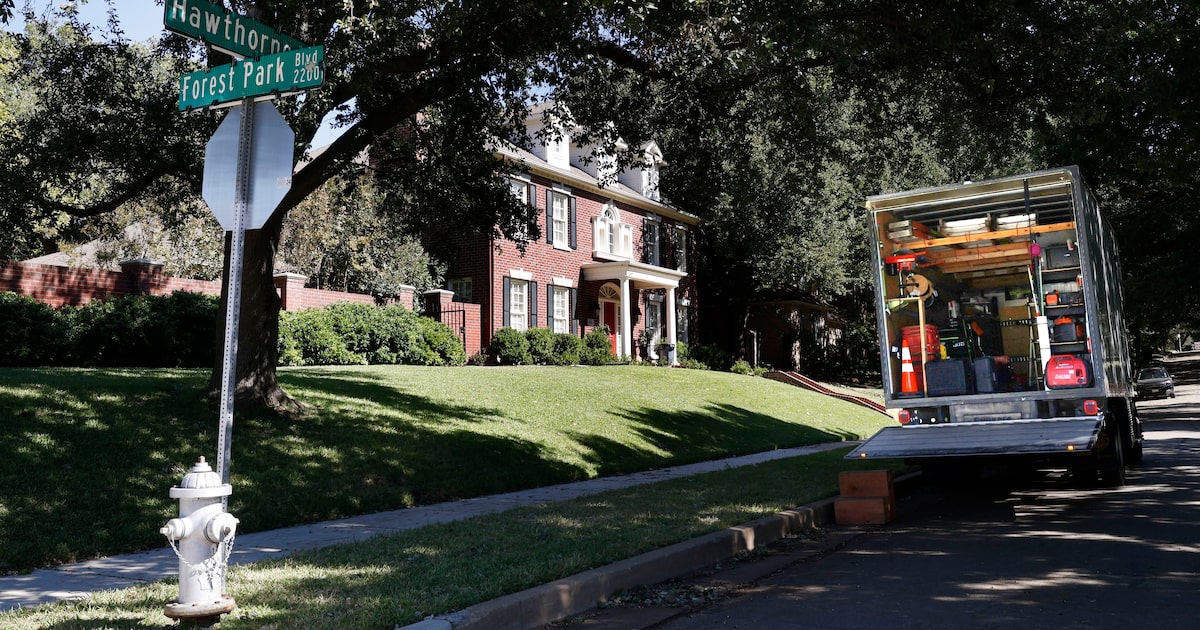FORT WORTH — Just off Forest Park Road, in a leafy century-old neighborhood, families gather for swim parties in the summer and parents push strollers past stately brick and stucco homes.
In recent months, a new spectacle has emerged in Berkeley Place: massive trailers with lights and cameras inching down residential roads and orange barrels announcing road closures. Just out of sight, actors film scenes for some of the most popular shows on television.
Filming is booming in Fort Worth, where entertainment giant Taylor Sheridan shoots hits like Lioness, Landman and the upcoming Rio Paloma, a spinoff of Yellowstone. The burgeoning industry has generated plenty of buzz, along with nearly $1 billion in revenue and some 50,000 jobs over the past decade. At her State of the City address last month, Mayor Mattie Parker called film the “next great industry in Fort Worth” and compared its success to cattle, defense and railroads.
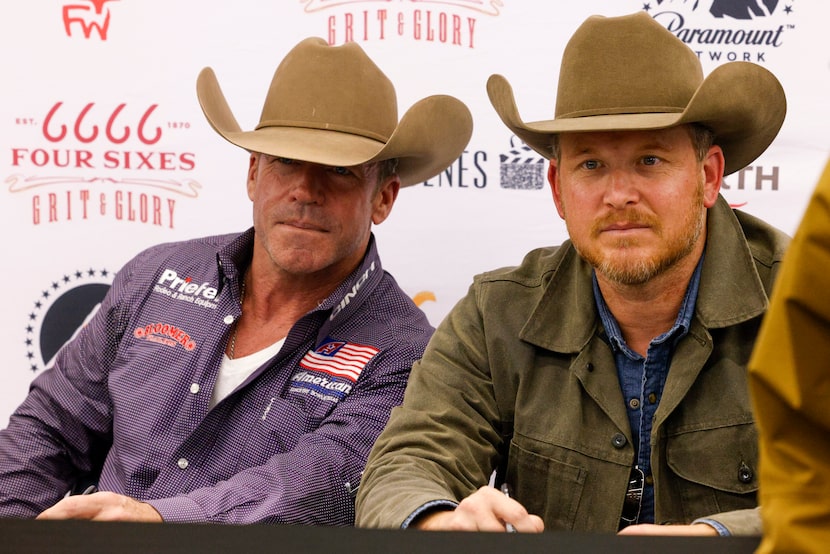
“Yellowstone” creator Taylor Sheridan (left) and actor Cole Hauser pose for a photo while signing autographs for fans at the Fort Worth Stock Show and Rodeo in Fort Worth on Feb. 3, 2023.
Elías Valverde II / Staff Photographer
Breaking News
Yet some residents say they are increasingly frustrated with frequent closures of busy thoroughfares, difficulty accessing their neighborhoods during shoots and too-little communication from filmmakers. They welcome the jobs and growth but say they would like city leaders to protect neighborhoods from becoming makeshift soundstages.
“It’s absurd that film crews are allowed to disrupt our lives for days on end,” said Cherri Cetto, who for 25 years has lived in Mistletoe Heights, where streets frequently shut down this fall.
Some of the discussion plays out on neighborhood social media pages, where residents grumble about road closures and communication from studios, including Paramount, which produces Sheridan’s shows. When a film crew shooting Lioness, starring Zoe Saldana and Nicole Kidman, requested some homes in Fort Worth’s Ryan Place neighborhood not display Halloween decorations until Oct. 14, some residents scoffed.
“They have a lot of nerve,” a neighbor wrote.
Related
 Tension heats up
Tension heats up
Tension between filming and residential neighborhoods could grow in coming years, and not only in Fort Worth. Texas legislators earlier this year approved $1.5 billion in film incentives for the next decade in an ambitious effort to lure Hollywood and compete with neighboring states such as Louisiana and New Mexico. Film projects will be able to apply for a grant rebate of up to 31% on certain expenses, such as wages for Texas workers and flights on Texas-based airlines.
Dallas is not immune to the growing pains. In June, the Margaret Hunt Hill Bridge closed for hours without notice for the filming of a music video featuring Dallas rapper Big XthaPlug and country star Shaboozey. The closure, which brought traffic to a standstill, prompted an outcry online and among drivers, with some questioning the decision by the city and state to shut down a major highway on a weekday.
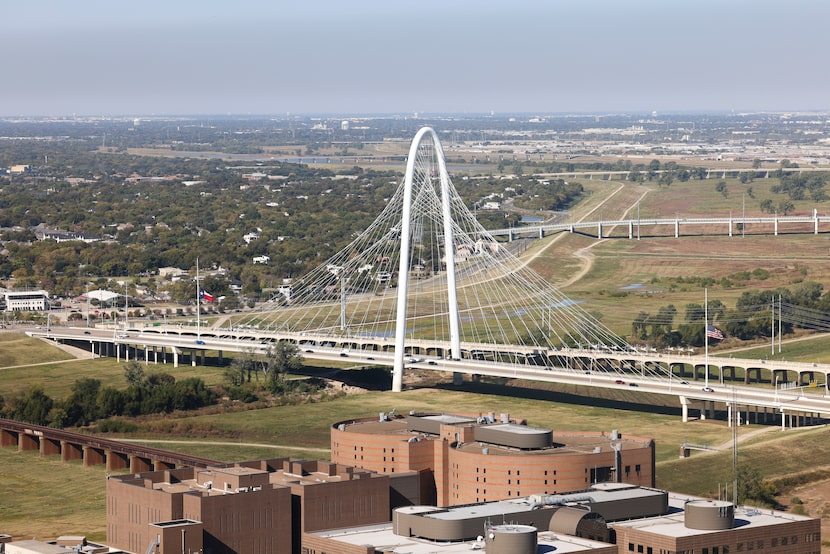
Margaret Hunt Hill Bridge photographed on Nov. 6, 2025, in Dallas.
Shafkat Anowar / Staff Photographer
In Fort Worth, some residents want the city to consider limiting the number of hours or days of filming per month in a given neighborhood. Others, citing scant information from film crews, say a text alert system announcing film times and locations would be helpful. Many said they would like closures of major streets kept to a bare minimum.
“I do get that Fort Worth needs business growth, but the city has to take into account how it’s impacting the residents,” said Graham Brizendine, vice president of the Mistletoe Heights neighborhood association. “There has to be a balance.”
Fort Worth Councilwoman Elizabeth Beck, who represents neighborhoods on the near south side where filming is common, has met with Brizendine and others to discuss the issues. Beck said the industry is driving growth and residents feel pride in seeing their city in the spotlight, but she acknowledged filming “has not been without some bumps.”
“There has been a learning curve,” she said. “But as filmmakers get more familiar with Fort Worth and Fort Worth gets more familiar with filming, we’re developing best practices.”
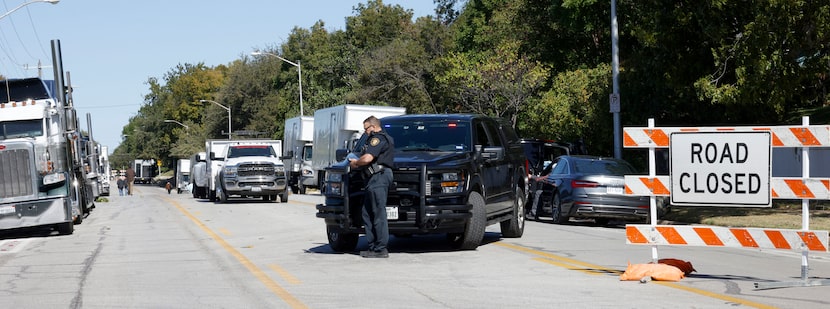
Forest Park Boulevard around Hawthorn Avenue is closed for filming of Lioness on Oct. 29, 2025, in Fort Worth.
Chitose Suzuki / Staff Photographer
Minimizing impact
Much of the behind-the-scenes work is handled by the Fort Worth Film Commission, which was created in 2015 to serve as a liaison between filmmakers and the city. In an email, Director Taylor Hardy said she works with city leaders and neighborhood associations to review and regulate film requests to minimize impact to residents and businesses.
In recent months, the commission has fielded some feedback from residents about communication and notifications for neighborhoods. Still, a citywide survey last month showed three-fourths of residents supported the industry, she said. Film tourism has the potential to attract a quarter million new visitors to Fort Worth each year, she said, boosting the economy and small businesses and helping the city maintain low taxes.
“We appreciate the support from Fort Worth residents and businesses as we navigate occasional detours or short-term closures while growing our economy through film production,” Hardy said.
City leaders can already point to big successes. The largest operating film studio in Texas — a joint venture between Sheridan’s production company SGS Studios, Paramount and Ross Perot Jr’s Hillwood — opened this year in the AllianceTexas development in far north Fort Worth.
Landman star Billy Bob Thornton recently sang the city’s praises ahead of a screening this month at the Modern Art Museum. “If I could shoot everything I do in Fort Worth, I would,” he said while walking down the red carpet. Other celebrities have dished about their favorite restaurants, the best shopping and preferred movie theaters.
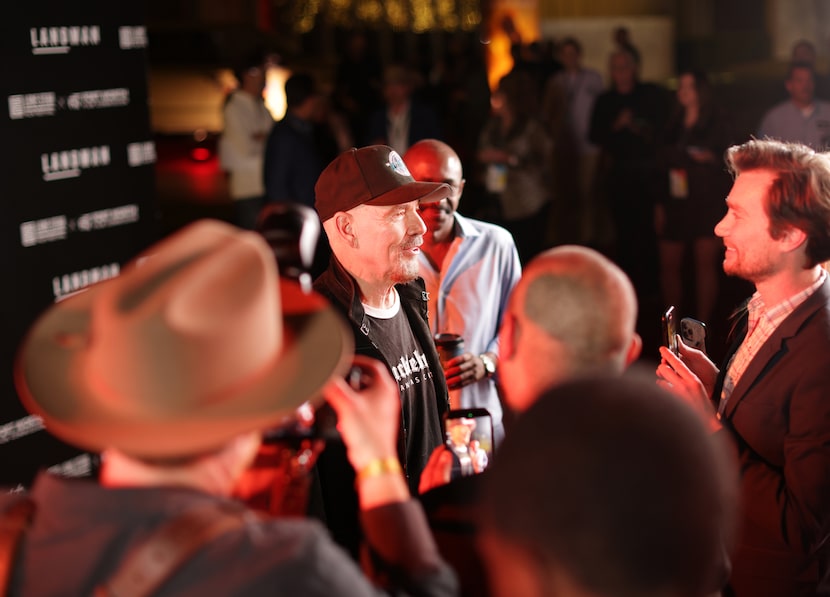
Billy Bob Thornton gives an interview during a red carpet event for the season 2 premiere of Landman at The Modern Art Museum of Fort Worth on Nov 6, 2025.
Jason Janik / Special Contributor
Arguably the most unassuming of Texas’ largest cities, Fort Worth was nicknamed “Panther City” after a visiting Dallas attorney joked in the late 1800s the town was so sleepy he saw a panther snoozing in the middle of downtown. Meant as an insult, Fort Worth proudly assumed it as a moniker.
The city is figuring out how to balance that history with filming. Earlier this year, when people asked on a neighborhood Facebook page if anyone else heard the sound of gunshots, someone pointed out it might have come from planned simulated gunfire for a Lioness shoot.
Perhaps not surprisingly, street closures irritate residents more than anything. Mary Wells recently moved with her family from downtown Fort Worth to the Fairmount neighborhood near Magnolia Avenue. When she lived downtown, she said filming created a festive atmosphere, and she loved walking by the shoots to try to catch a glimpse of an actor. When she moved, however, she was forced to navigate street closures, often with no detours.
City leaders, Wells said, should address these issues sooner rather than later.
“The money and public relations are going to be good for Fort Worth,” Wells said. “But with all of the state incentives coming, this could get crazy. Now is the time to establish some parameters.”
As the industry grows, the mayor said in a statement that it is critical to have guardrails in place to maintain the “highest quality of life” in neighborhoods where filming is happening but did not say whether she would support restrictions.
Beck, the council member, said she foresees a successful partnership with film and Fort Worth as the kinks work out.
“We want the film industry here. They are making tremendous investments in Fort Worth,” she said. “But at same time, we’re not writing a blank check to the industry at the expense of our residents.”
